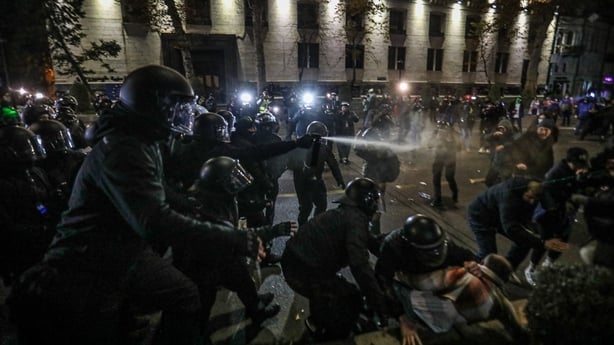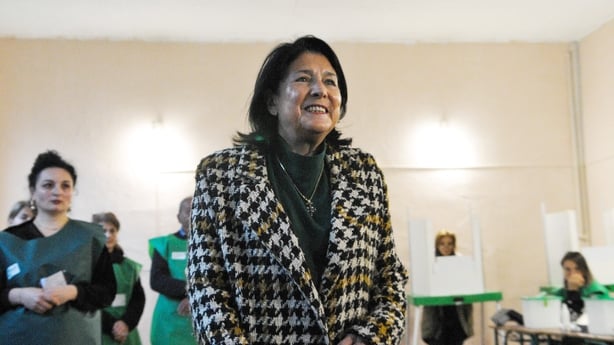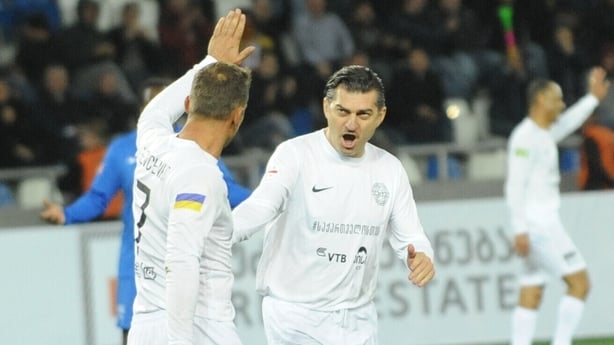Georgians have a new president this weekend despite not actually voting in the election.
Mikheil Kavelashvili, a former professional footballer who briefly played for Manchester City in the mid 1990s, was hand-picked by the ruling Georgian Dream party as their contender for the job.
Opposition parties boycotted the vote and Mr Kavelashvili was the sole candidate.
Instead of a popular vote, a new electoral college of 300 politicians – made up members of parliament and representatives from local councils – voted on Mr Kavelashvili’s nomination this morning in the Georgian parliament in Tbilisi.
The date for the vote and change to an electoral college system was set in 2017 after Georgian Dream used its parliamentary majority to push its proposal on how the president should be elected.
The indirect vote took place amid an already tense political crisis in the country, with pro-EU opposition groups protesting in the streets against the Russian-leaning Georgian Dream (GD) government, which has tightened its control over state institutions since coming to power in 2012.
Opposition supporters accuse the government of pushing Georgia towards a Vladimir Putin-style autocracy and derailing the country’s chances of joining the European Union.
This morning’s vote also follows October’s disputed parliamentary election result that opposition parties say was rigged.
Over the past two weeks, large-scale protests have taken place by pro-EU supporters after GD announced it was halting accession application talks with the EU until 2028.
Clashes have taken place in recent days in Tbilisi between police and pro-EU supporters. More than 400 people have been arrested by police who have used tear gas and water cannons to disperse crowds.
Groups of masked men have attacked independent journalists reporting on the protests, while Georgia’s interior ministry has said that 150 police officers have been injured during the clashes.
“Georgia cannot survive as an independent political nation if it becomes part of Russia again, formally or informally,” Levan Tsutskiridze, an opposition leader from the Strong Georgia coalition, told RTÉ News.
Mr Tsutskiridze has taken part in the nightly protests in Tbilisi and said the mood among protestors was one of “defiance and persistence”.
The protestors, he said, do not want to allow the government to “kill Georgian democracy and change our foreign policy direction”.
Elected MPs from the Strong Georgia, like all of Georgia’s pro-EU opposition parties, have refused to take their seats in parliament since the disputed parliamentary election on 26 October.
Georgia’s electoral commission declared days after the election that the ruling GD party won 54% of the popular vote, far exceeding predictions made by various independent pollsters.
Opposition parties claimed that widespread fraud and voter intimidation had taken place. The EU called for reports of voting irregularities to be investigated while, in late November, the European Parliament called for a re-run of the election.
GD maintains that October’s election was fair and has dismissed accusations of voting irregularities. It won 89 of the parliament’s 150 seats. But with no pro-EU opposition MPs taking their seats, the parliament in Tbilisi now consists of GD politicians and a few populists aligned with the government.

During its parliamentary election campaign, GD did not mention its intention to halt Georgia’s talks with the EU but, symbolically, had campaigned with part of the EU flag emblazoned across its own party emblem.
In recent years. the ruling party has upped its anti-western rhetoric and introduced illiberal policies such as a bill last September that banned same-sex marriage and adoption by same-sex couples.
Critics accuse the government of asserting greater control over the country’s regulatory institutions, including the national bank, as well as pushing the party’s traditionalist agenda on state-run cultural bodies.
The past two weeks of protests have not gone unnoticed outside of the country.
On Thursday, the US State department said it would limit visa access for 20 Georgian government officials for their role in undermining democracy.
The EU is also considering whether to impose targeted sanctions on Georgia’s government.
GD’s billionaire founder, Bidzina Ivanishvili, has spoken in vague terms about a so-called “Global War Party” in the west wanting to push Georgia into another war with Russia.
Large-scale protests by pro-EU supporters had already taken place last May when the government pushed through a Kremlin-style ‘foreign agent’ law, requiring organisations that receive more than 20% of their funding from abroad to register as pursuing the “interests of a foreign power”.

The country’s incumbent President, Salome Zourabichvili, has not recognised the electoral commission’s decision that GD won the election.
She has supported protests against the government’s decision to halt talks with the EU and joined protestors on the streets of Tbilisi at the end of last month.
Mr Tsutskiridze said that his party would continue to recognise Ms Zourabichvili as the legitimate president and representative of the Georgian people.
Other pro-EU opposition parties have voiced a similar position.
Hans Gutbrod, a professor of policy research at Tbilisi’s Ilia State University, said Georgia was going through “one of the most profound crises” in the country’s living memory.
“Georgian Dream seem to be able to rule but I think it will be very hard for them to govern in the sense of actually solving any of the underlying problems,” he said, referring to the country’s economy, and its health and education sectors.
Today’s indirect election by the Georgian parliament of Mr Kavelashvili is likely to further exacerbate an already tense political situation.

Mr Kavelashvili doesn’t come across as someone who can unite the deep divisions in Georgian politics.
He was elected as a GD member of parliament in 2016 but in 2022 co-founded a more hardline, anti-western party called People’s Power.
Opposition parties don’t entirely oppose the new electoral college system of electing a president. But they say it can only work if the composition of the parliament and regional authorities is fair.
Under GD rule, the powers of the Georgian president have been reduced but the office holder still represents the country on the world stage.
So far at least, the protests in Tbilisi have not grown into a permanent Maidan-type encampment around the parliament area. Unlike their Ukrainian counterparts in late 2013, protestors pack up and go home at the end of each night’s protest.
Mr Kavelashvili will be sworn in on 29 December as Georgia’s new president but Ms Zourabichvili has said she won’t leave her role, setting the stage for an even deeper constitutional crisis.
Pro-EU protestors appear set to stick it out in the cold winter nights.
“I think everyone realises this is not going to be a short fight,” Mr Tsutskiridze said of the current opposition protests.
“It’s not going to end [Saturday], but I think people are realistic and the spirit is there which is most important”.

